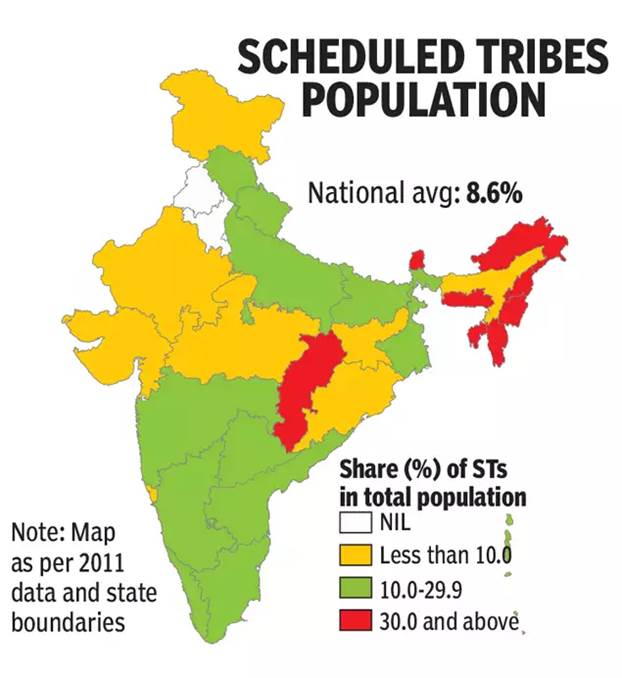Description

Copyright infringement not intended
In News
- After examining the proposal received from the Ministry of Tribal Affairs, the National Commission for Scheduled Tribes (NCST) has approved the inclusion of the ‘Pahari ethnic group’ under the Scheduled Tribes list of the Union Territory of Jammu and Kashmir.
- The commission also suggested the inclusion of the “Koli” and “Gadda Brahman” communities to be included under the ST list of Jammu and Kashmir.
- The proposed ST status for the Pahari people was recommended by Justice G.D Sharma Commission.
- The commission was set to add more tribes and castes in educationally and socially backward classes in the J&K union territory.
Pahari People
- The Pahari person is a blanket term used for several heterogeneous communities inhabiting Jammu and Kashmir, Uttarakhand and Himachal Pradesh.
- Pahari people are found in the lower Himalayas.
- Their population estimated at around 1 million is found in the region between the Jhelum and Chenab rivers: most significantly in the districts of Poonch and Rajouri, also scattered throughout the region of Jammu and Kashmir.
- In 1989, The Government of J&K established an Advisory Board for the development of Pahari Speaking People and the welfare of the Pahari People.

Characteristics for a community to be identified as STs:
- The primitive way of life and habitation in remote and less easily accessible areas.
- Distinctive culture.
- The shyness of contact with the community at large.
- Geographical isolation.
- General backwardness in all respects
National Commission for Scheduled Tribes
- Established by amending Article 338 and inserting a new Article 338A in the Indian Constitution through 89th Amendment Act.
- Appointed by the Indian President for 3 years office term.
- Chairperson equal to the rank of Union Cabinet Minister, and Vice-Chairperson that of a Minister of State and other Members have the rank of a Secretary to the Government of India.
- Function:
- Investigate and Monitor matters relating to Safeguards provided for STs.
- Inquire into Specific complaints relating to the Rights & Safeguards of STs.
- Participate and Advise in the Planning Process relating to the Socioeconomic development of STs.
- Submit a report to President annually.
- Discharge Such other functions concerning STs as the President may, subject to the provisions of any law made by Parliament, by rule specify.
- Powers of a Civil Court, having authority to;
- Summon and enforce the attendance of any person and examine on oath.
- Discovery & production of any documents.
- Receive evidence on affidavits.
- Requisition any public record or copy thereof from any court or office.
- Union and every State Govt. to consult the Commission on all major Policy matters affecting Scheduled Tribes.
Constitutional Safeguards for STs
- Article 15, Special provisions for the advancement of other backward classes(which includes STs).
- Article 23, Prohibition of traffic in human beings and beggars and other similar forms of forced labour.
- Article 24, Forbidding Child Labour.
- Article 29, Protection of Interests of Minorities (which includes STs).
- Article 46, State Shall promote, with Special care, the educational and economic interests of the weaker sections of the people, and in particular, of SCs, and the STs, and shall protect them from social injustice and all forms of exploitation.
- Article 164, Provides for Tribal Affairs Ministers in Bihar, MP and Orissa.
- Article 243, Reservation of seats in Panchayats.
- Article 244, Provisions of the 5th Schedule shall apply to the administration & control of the Scheduled Areas and Scheduled Tribes in any State other than the states of Assam, Meghalaya, Mizoram and Tripura which are covered under the 6th Schedule.
- Article 275, Grants in-Aid to specified States (STs&SAs) covered under 5th and 6th Schedules.
- Article 330, Reservation of seats for STs in Lok Sabha.
- Article 337, Reservation of seats for STs in State Legislatures.
- Article 334, 10 years period for reservation (Amended several times to extend the period).
- Article 350, Right to conserve distinct Language, Script or Culture.
- Article 350, Instruction in Mother Tongue.
- Article 371, Special provisions in respect of the NE States and Sikkim.
- Service Safeguards under Art 16, 335, and 320.
- Safeguards under Various laws:
- SCs & STs (Prevention of Atrocities) Act.
- Bonded Labour System (Abolition) Act.
- Child Labour (Prohibition and Regulation) Act.
- Forest Conservation Act, Panchayati raj (Extension to Scheduled Areas) Act.
- Minimum Wages Act 1948.
https://epaper.thehindu.com/Home/ShareArticle?OrgId=GORAFEORB.1&imageview=0













